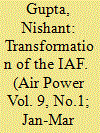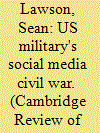| Srl | Item |
| 1 |
ID:
034901


|
|
|
|
|
| Publication |
Hague, Mouton, 1969.
|
| Description |
304p.
|
|
|
|
|
|
|
|
|
|
|
|
Copies: C:1/I:0,R:0,Q:0
Circulation
| Accession# | Call# | Current Location | Status | Policy | Location |
| 008927 | 355.0213/DOO 008927 | Main | On Shelf | General | |
|
|
|
|
| 2 |
ID:
130815


|
|
|
| 3 |
ID:
132050


|
|
|
|
|
| Publication |
2014.
|
| Summary/Abstract |
This article uses the controversy within the United States (US) military over the use of social media by individual military professionals as a window into larger debates about the nature of information-age conflict. Information and associated technologies are now central to the US military imaginary. But the controversy over social media is one indicator that the dominant discourse of information-age conflict is neither stable nor total. The introduction of a new technology can serve as an antagonism that turns latent, potential contradictions into substantive differences for policymaking. Thus, though the US military generally has embraced information and communication technologies (ICTs), the introduction of a particular ICT can still be a source of controversy. Military imaginaries, technologies and the relationships between them remain dynamic, contingent and sometimes contentious.
|
|
|
|
|
|
|
|
|
|
|
|
|
|
|
|
| 4 |
ID:
123227


|
|
|
|
|
| Publication |
2013.
|
| Summary/Abstract |
The history of the Red Army in the Civil War of 1918-1922, in its significant part, was a history of mass treason and desertion of thousands of former officers (military specialists). Among them there were hundreds of General Staff specialists, the real representatives of Soviet military elite, whose treason was extremely dangerous for the fate of Soviet Russia. The treasons were both individual and group when the whole Soviet staffs fled to the Whites. Among the defectors there were representatives of almost all staff and command levels including several army commanders. These specialists of high qualification with academic background were aware of Soviet war plans, mobilization questions, and other classified data and could issue harmful orders before their defection to the enemy and influence the situation on the front. This article describes the reasons, history, circumstances, and results of this process that remained widespread until the decisive victories of the Reds in 1920. According to the calculations by Andrey Ganin, based on the vast, previously unknown data from Russian archives, almost every third General Staff specialist deserted the Red Army during that war. In spite of this, Bolsheviks managed to unite the experience of the military professionals with the new administrative methods and 'with iron and blood' organized powerful and effective military force which finally gained victory in the Civil War.
|
|
|
|
|
|
|
|
|
|
|
|
|
|
|
|